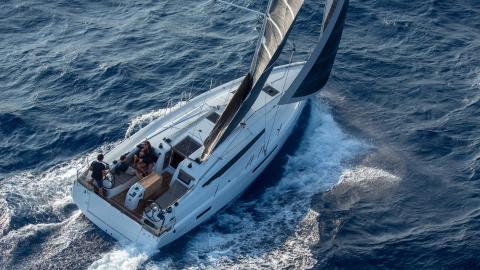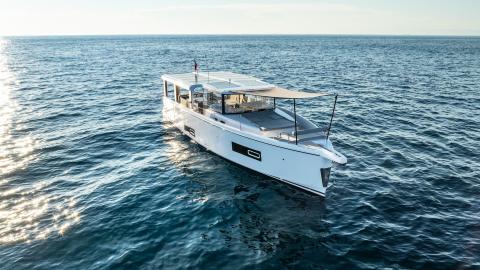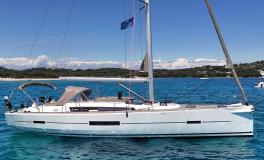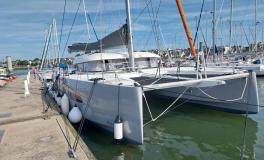 Jeanneau 55
Jeanneau 55
8-step guide to buying a previously-owned boat
Planning your budget
It is very important to decide on your budget before starting to look for a second-hand boat. You need to plan the purchase expenses as well as the annual maintenance costs ( insurance, docking costs, anchorage charges, maintenance, spare parts etc.)
Planning your project
Once your budget is set, it is important to plan your project in terms of the navigation zone of your future boat and which type of boat would best meet your needs.
Select more than one vessel
You now know your budget and the type of boat best adapted to your needs – you can begin your searches and select a reasonably small number of boats.
Checking the condition of the boat
Once you have found a boat that looks right for you, how do you know if it is really as described in the advertisement? What are the main points you should tick off during your initial visit?
- The external appearance of the boat is a good indication of its general state of maintenance: if it seems grimey then this might indicate that the boat has been poorly maintained; a hold awash with oil or water can say a lot about the state of the rest of the boat.
- Don't hesitate to lift up the planks to look at the sluice-gates and keel bolts – this will give you a good indication of the level of upkeep of the boat. You should also check around the engine cover and fixed portholes to see if there is any condensation or traces of water leaks...
- Inspect the ship's decking by walking over it barefoot or in socks, taking heavy steps to see if there are any weak areas or any peeling. Have a look at the rigging and the state of the sails. Don't forget to look at the mooring equipment ( windlass, chain and anchor).
- Also verify the boat's ownership and, if there are co-owners, that they are all in agreement about the sale. Make a visit to the registration authorities (customs, for French boats), to check that the boat isn't already pledged to a third party or the object of a loan. It is important to be sure that this information appears on the purchase agreement and that full consent of all parties is obtained before payment is made. In most countries, a boat is subject to annual taxes known as ‘Annual Navigation taxes’ and they must be paid up by the ship's owner before the sale. If this is not the case then the transfer of ownership will be blocked until the taxes have been paid in full.
For each of our boat sales, all of these services are a part of our procedure and included in our overall fee agreement.
The purchase agreement
You will have a better idea of the state of your potential boat once these points have been checked off. You will be in a better position to sign a purchase agreement – with the proviso that the sale is subject to the expert's report, and that the said expert will carry out a thorough inspection of the boat in order to confirm its current condition and in order to be able to insure it.
The expert's report
The expert's report is strongly advised for several reasons:
- No reputable insurance company will insure a boat without having seen an expert's report;
- The expert's report will enable you to withdraw from any potential purchase if any serious problems are uncovered, and to recover your deposit;
- It will help you to make a good choice of boat;
- It will allow you to decide if there are any works or repairs to be carried out, either in the immediate term or in the longer term.
The costs of the expert's report and of the removal of the boat from dry dock are the purchaser’s responsibility. The purchaser therefore chooses his / her own expert.
The expert's visit generally takes place in your presence and is thus a useful means of finding out about your future boat.
If the sale is not completed (if a serious fault that would jeopardise the boat's seaworthiness is brought to light during the expert's visit), then the deposit cheque will be immediately returned to the purchaser and the purchase agreement will be declared null and void.
Once the expert's report has been made and the suspension clauses removed from the agreement – at the latest this will be the date mentioned in the purchase agreement - the purchase can be made. This is the next step in the procedure.
The purchase
Once the suspension clauses have been lifted you can purchase the boat. If there are co-owners then the agreement must be signed by all owners featuring on the boat's registration documents. There will be 4 or more copies of the agreement drafted (one for Customs, one for The Maritime Agency, one for the purchaser and one for each owner). All agreements must be in their original form.
Transfer of ownership or transfer of registration
If the boat you are buying is already registered in a member country of the European Union and you yourself are a European citizen, then you do not have to transfer the registration of the boat. Equally, you can register it in your country of residence: in order to do this you first have to un-register your boat and then, with the document thus obtained, register the boat in your own country.
The procedure is much simpler if the boat is already registered in your country of residence. If you buy a French boat that has a pleasure-boat booklet, the Customs office where your boat is registered will deal with the registration transfer; following this step, the transfer must be registered with the Maritime Agency, see pages 21 and 22 of the navigation deed booklet.
All of the above actions and steps are an integral part of our procedure when selling a boat that is entrusted to us, (arranging the expert's inspection, drafting the purchase agreement, recovery of any loan agreements of less than one month from the services concerned, drafting of the sale agreement, transfer of ownership and registration of the vessel). The purchaser or the seller are free to carry out any of the above steps themselves.
Recommendations
We draw your attention to the European Certificate of Conformity (COC): if the boat you are interested in does not possess this certificate, it will be extremely difficult to register it in a European Union member country.
All boats built in Europe since 16th June 1998 hold this certificate.
For those built outside the EU before this date, only those already registered in an EU country before 16th June 1998 are exonerated from this certification.
For example: if a boat of French or European build was constructed before 16th June 1998 and had not been registered in Europe but in another country (the USA, Canada etc), it would be almost impossible for it to be registered in Europe. You would not therefore be allowed to sail your boat in European waters. Buyers are regularly confronted with this problem: they purchase a vessel without the COC and find it is not possible to then obtain European registration.
This type of situation is not as rare as it may seem!
We are available at all moments during the above process and want the purchase of your boat to be a stress-free and pleasurable moment, rather than a stressful and disappointing one.






